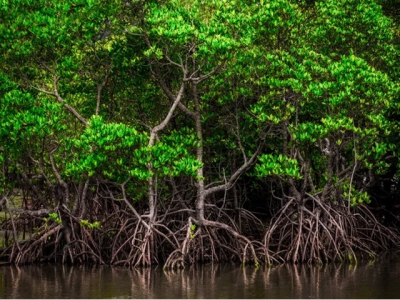Indonesian shrimp initiative gains World Economic Forum endorsement

The benefits of a mangrove-sensitive shrimp aquaculture project that’s currently operational in Indonesia have been highlighted in a recent article by the World Economic Forum.
Selva Shrimp puts some of its shrimp farming revenues back into restoring Indonesia's coastal mangrove forests
The article* notes that around 70 percent of Indonesia’s mangrove forests have been damaged or degraded by aquaculture, according to the Global Mangrove Alliance (GMA). However, the WEF argues that “following a nature-based solutions (NbS) approach can ensure that the world’s growing population can be fed without degradation of such valuable ecosystems”.
The initiative highlighted in the article is Selva Shrimp, a programme managed by Blueyou Consulting. First launched in Vietnam, the project combines small-scale farming with active measures to protect the environment. This way, it’s not just producing food sustainably – it’s creating jobs and protecting livelihoods, too.
Backed by the IUCN's Blue Natural Capital Financing Facility, Selva Shrimp is piloting the inclusion of NbS into shrimp farming in Indonesia to meet the world's growing appetite for consciously produced seafood. The effort aims to demonstrate the financial sustainability of such projects and their attractiveness, in order to show the world a path towards rectifying negative impacts generated during decades of unsustainable farming practices.
Located in the Indonesian part of the world's largest island, Borneo, Selva Shrimp Kalimantan puts additional revenues back into restoring the area’s coastal mangrove forests.
The company says everything the shrimp need to grow is provided by the mangroves, and that its programme provides incentives for farmers to change existing practices. Among these are substantially increased harvest sizes through improved farming practices and healthier environments, and a higher price for this premium product. Harvested mangrove areas are reforested with young trees, it says.
At the same time, the forests remain a liveable habitat and food source for many other aquatic species, including crabs, oysters and mudskippers.
The company wants to expand the project across the region. In total, Indonesia boasts a fifth of the world’s mangrove forests, according to the GMA, so WEF believes that schemes such as this could have a significant impact.
*A longer version of this article was published by The World Economic Forum as part of its Jobs Reset Summit.
Related news
 Hydrolysis of pangasius by-products to produce organic fertilizers
Hydrolysis of pangasius by-products to produce organic fertilizers A raw enzyme protease will be created after bacteria is injected to rice bran powder and soy bean within 60 hours, pH 8.4. Protease will be filtered, dried
 Bình Thuận imported more than 35,300 white leg adult shrimp
Bình Thuận imported more than 35,300 white leg adult shrimp Facilities that import shrimp broodstocks already notified the Sub-department of fisheries regarding the management and supervision of timely usage
 Vietnamese shrimp farmers flock to new app
Vietnamese shrimp farmers flock to new app An app that lets shrimp farmers to track shrimp growth from stocking through harvest, purely by taking pictures on their smartphone, is generating very positive